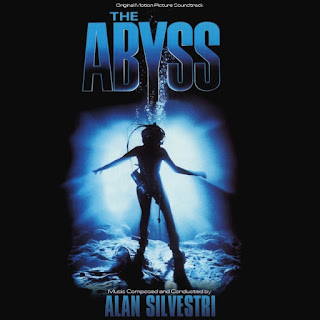Deep Rising (Original Motion Picture Score)
Music Composed and Conducted by Jerry Goldsmith
Our next title for Renovatio Records’ ocean-related-films cycle is Jerry Goldsmith’s score for action horror comedy Deep Rising. The 1998
film, directed by Stephen Sommers and starring Treat Williams, Famke Janssen,
Anthony Heald, Kevin J. O’Connor, Wes Studi, Jason Flemyng and Djimon Hounsou
is a tongue-in-cheek monster movie in which a group of mercenaries boards the
luxury liner Argonautica with the plan of stealing its safes, only to find that
all passengers have been killed by a huge octopus-like creature. They quickly realize that they’re stuck
fighting for their lives as the creature's flesh-sucking tentacles swarm the flooded hallways of the cruise ship. While the film was met with very negative reviews, it cannot be
denied that it’s a very enjoyable and thrilling ride from start to finish, and
much of that is because of Goldsmith’s robust orchestral score.
The music for Deep Rising is the typical 90s Goldsmith action
score, with big brass sections dominating the music and unnerving string passages
following closely, all augmented by a loud electronic percussion and
synthesized effects. Though the highlights can be found in the action music
mostly, the most memorable cues certainly involve three distinct themes. The
first theme opens the score with the track “Underwater Grave”, and it’s a very effective growling low-register brass descent composed for the menacing monster. The
track quickly erupts into a heroic brass and electronic percussion theme, which
was unused in the picture and reserved for the end credits only. And the third theme
is an adventurous horns theme for Treat Williams' protagonist; this thrilling theme even receives a lovely
lyrical treatment in the opening of “Mourning Leila”. And if all the bombastic action
music throughout and these three themes are not enough for you, you’ll also find
an enjoyable military motif for the heavily armed mercenaries in “Boarding the
Ship”, as well as an intriguing small motif for harp, piano and flute for Janssen’s
intrepid character. Goldsmith also takes some time to play around with
electronics for the quieter suspense scenes, with pulsating electronics that will keep you at the edge of your seat until all hell breaks loose.
The score was released in 1998 by Hollywood Records in the
form of a 33-minute album that merged several cues together and was missing
some notable pieces of music, namely the majestic cue for the first sight of
the Argonautica, as well as the monstrous treatment of the monster theme for the scene in which the creature is fully revealed at the end. In 2014, Intrada Records issued an
expanded product with a running time of almost 70 minutes, which many film score
enthusiasts found tedious and overlong. Renovatio Records proudly offers
you a new presentation of the score that includes all of its highlights, making of it a wild, crazy and exciting experience as it was always meant to be. So sit back
and enjoy Goldsmith mastering the genre and certainly putting your listening
equipment to the test. Full brass ahead!
Track Listing:
1. Underwater Grave (2:40)
2. The Argonautica (1:32)
3. Coming From Below (4:20)
4. Boarding The Ship (3:46)
5. Stay Close (4:50)
6. Tentacles (5:11)
7. Underwater Attack (2:36)
8. Lurking Monster (2:47)
9. Wall Of Water (3:20)
10. Mourning Leila (1:41)
11. Jet Ski Chase (5:27)
12. Escape & Main Credits (2:57)
Total Running Time: 41:07
Cover Artwork:















